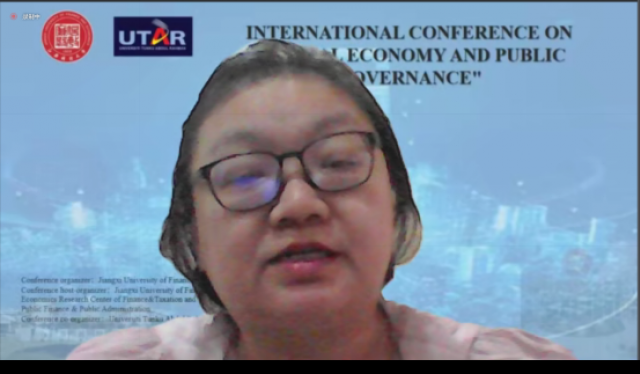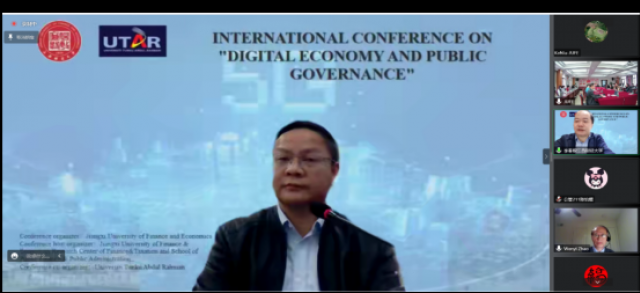Dr. Zheng Jiaxing and Xie Tianyuan delivered a keynote speech at the International Conference on "Digital Economy and Public Governance"

Zheng Jiaxing, a lecturer from Zhejiang University of Finance and Economics, and Xie Tianyuan, a student from The University of Western Ontario, delivered a keynote speech titled Research on the Multilateral Instrument and Its Practice in China.They introduced the Multilateral Convention to Implement Tax Treaty Related Measures to Prevent Base Erosion and Profit Shifting (Multilateral Instrument or MLI), which aims to revise thousands of existing bilateral tax agreements in a multilateral manner, the MLI is an important part of the G20 and OECD action plan. And summarized the characteristic and function of MLI. First, high flexibility applied across different countries and cases. Second, allows to clarify the specific provisions that are not applicable to Covered Tax Agreements. Third, retention of the minimum standards.
They pointed out that the relationship between MLI and the Covered Tax Agreement is neither alternative nor abolished, but coexist, and in different cases, the MLI will make different types of amendments to the Covered Tax Agreement. When the party covering the tax agreement applies a clause of the Agreement, it shall first inquire whether there are any amendment rules for the clause in the MLI text. And a list of notice submitted by the MLI is required. If neither of the parties retains the MLI and makes the same option to the MLI, the amendment rule will be adjusted by the MLI's revised rules. Conversely, if the above requirements are not met, only the unrevised terms of the agreement can be applied, and the MLI will not play a revised role
From the view of OECD, There are some advantages of the MLI's implementation. One aspect is that it provides for different types of flexibility. Firstly, jurisdictions can choose amongst alternative provisions in certain MLI. Secondly jurisdictions can choose to apply optional provisions. Thirdly, jurisdictions can choose to reserve the right not to apply MLI provisions with respect to all of their Covered Tax Agreements. Fourthly, jurisdictions can only possibily choose to be out of provisions that do not reflect a BEPS minimum standard, with the possibility to withdraw their reservation (and opt in)later. However, there are some potential disadvantages. Firstly, it only applies to tax treaties specified by contracting states in their notifications to the OECD Secretariat. Secondly, it only provides for binding arbitration, contracting parties enjoy a great deal of autonomy and flexibility in choosing arbitration rules
From the view of signatories, There are some advantages of the MLI's implementation. Firstly, provided an efficient instrument to swiftly and consistently implement. Secondly, set out all of the Signatory's choices with respect to the different options. Thirdly, Gathered consensus of the contracting states and stated purpose of the company all encourage the contracting states to adopt as many of the recommended clauses in the convention as possible. On the other hand, there are some potential disadvantages. Firstly, MLI relies too much on bilateral negotiations by Parties. Secondly ,MLI overly relies on mutal negotiation process, which increases the complexity of resolving process. Thirdly, Many of the alternative, optional provisions in the MLI only apply if all contracting parties to the treaty expressly choose to apply them.
So in order to solve current tax challenge, they put forward some suggestions: First, eliminating hybrid mismatch. Secondly, aviod tax treaty abuse. Thirdly, improve permanent establishment rules. Fourthly, improve tax dispute resolution and compulsory arbitration.
At last part, they stated the China’s experience in approval for MLI. China has deposited its instrument of approval for the Multilateral Convention to Implement Tax Treaty Related Measures to Prevent Base Erosion and Profit Shifting (BEPS Convention). The Convention will enter into force on 1 September 2022 for China. China has adopted two types of outcome proposals in the MLI, one is the BEPS minimum standard clause, including the preamble to the agreement to prevent no or less tax evasion, and the main purpose test clause for the abuse of the Agreement. Second, other BEPS results and suggestions that are usually included in the tax agreements signed by China in recent years, such as preamble to further develop economic relations and strengthen tax cooperation, provision that the tax agreement does not restrict the tax of resident countries and the rule of dual resident entities.
- ・Dean Au Yong Hui Nee delivered...
- ・Dr. Xi Nan delivered a keynote...
- ・Engineer Khaled Nedal Mahmod S...
- ・Professor Xi Weiqun delivered ...
- ・International Conference on &q...
- ・Sr. Research Scientist Zhao We...
- ・Dr. Zheng Jiaxing and Xie Tian...
- ・Professor Cassidy Julie delive...
- ・Jiangxi University of Finance ...
- ・国际合作与交流处杨勇副处长来学院开展学生出国(境)留学专题讲...

 Dean Au Yong...
Dean Au Yong... Dr. Xi Nan d...
Dr. Xi Nan d... Engineer Kha...
Engineer Kha... Professor Xi...
Professor Xi... Internationa...
Internationa... Sr. Research...
Sr. Research...